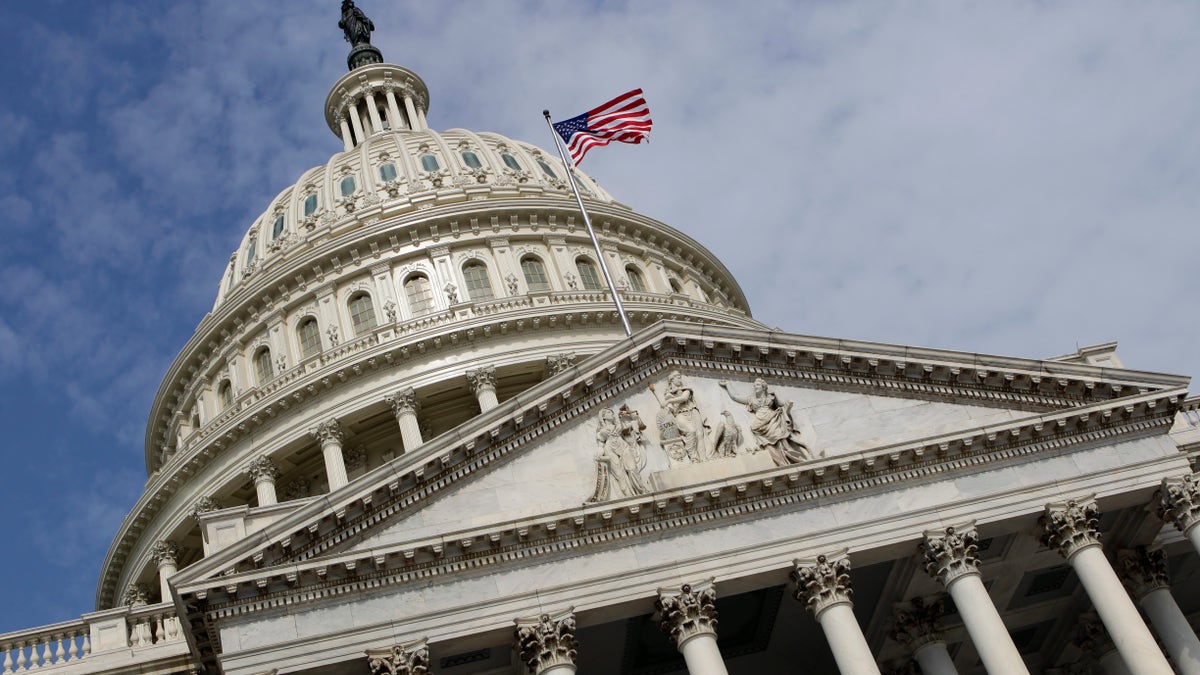
FILE --The Capitol dome on Capitol Hill in Washington. (AP)
Wednesday, President Obama gave an address on the U.S. economy at Knox College in Illinois in which he argued that the future looks much brighter for the country in part because the energy revolution in natural gas taking place right under our feet. But, disappointingly, neither the president nor Congress are making the most of this revolution and, hence, are reducing the economic benefits that would come from more drilling and more exports of this now abundant resource.
The fact is, America today is awash in natural gas.
Through technological advances in tapping into shale rock formations, the amount of recoverable natural gas reserves has grown by nearly 800 percent over the past seven years, with estimates that the United States has more than a century’s worth of supplies on hand.
The result has been a sharp and sustained decrease in the price of gas and, with that drop in energy prices, the prospect of a revitalized American manufacturing base and the jobs that will come with it.
Indeed, America’s natural gas reserves are so great that one study after the other has concluded that the U.S. can export natural gas with only marginal increases in prices here at home.
Not only would exporting gas abroad help reduce the country’s trade deficit and create additional jobs, but it would also have the strategic benefit of reducing the energy dependence of friends and allies on Putin’s Russia and states in the unstable Middle East—and, in turn, creating new and deeper ties to those same friends and allies.
[pullquote]
Countries such as Japan, South Korea and India are lining up to become long-term buyers of American natural gas if only the U.S. government would clear the path for American companies to build the necessary infrastructure to liquefy the gas and make it exportable globally.
But here’s the rub. Under U.S. law, the decision to license natural gas exports rests with the Department of Energy and, for a license to be issued, the department must determine that those exports are in the “public interest.”
The only exception being that, for countries with which the U.S. has a free-trade agreement, it’s assumed that gas exports meet that standard. Allies who have not signed an FTA with the U.S. (such as Japan, the United Kingdom or Lithuania), or strategic partners (like India and Taiwan) must face a higher hurdle before a license can be granted.
Over the past two years, the Energy Department has granted just two separate authorizations to export domestic-sourced natural gas to non-FTA countries, and other approvals have been slow in coming. The export application line is growing longer by the day, with 20 new license requests having been filed and still under review as of May of this year.
The problem with this slow pace of approvals and the more restrictive guidelines for non-FTA countries is that, when it comes to natural gas, “you snooze, you lose.”
Importing states have potential alternatives, such as acquiring gas from Australia, Canada, Nigeria and Russia. And once companies make the billions in investments necessary to bring that gas online and transport it, they have even less incentive to make similar investments here in the United States. In short, the apparent slow-rolling of approvals by the Obama energy team has significant opportunity costs both economically and strategically.
Moreover, there are real questions about whether the U.S. laws governing the export of natural gas run afoul of our commitments under the General Agreement on Tariffs and Trade (GATT), whose governing body is the World Trade Organization.
Under Article XI (“General Elimination of Quantitative Restrictions”) of GATT, the United States and other signatories have pledged not to adopt measures that would curtail the export of any good, with the key exception being the “conservation” of some good or commodity demonstrably in critical shortage. However, given the glut of domestic gas reserves—a glut that will continue as far as the eye can see—it’s hardly plausible that the administration could use this GATT exception to justify the current law or policies.
Finally, if the U.S. were to claim this exception, under WTO rules, it would have to impose regulations to curtail domestic production and consumption of gas as a sign that the government is serious about conserving natural gas.
Yet no such regulations or proposed laws have been put forward. Quite the opposite, domestic manufacturers, electric power companies and chemical firms are pushing for as rapid a development of shale gas fields as possible.
Defending the current export regime for natural gas also requires Washington to ignore its own record of challenging other countries that have violated GATT’s free-trade provisions.
In 2009 the U.S. and several other governments argued that Chinese restrictions on the export of various raw materials (magnesium, coke, bauxite, zinc, etc.) were contrary to GATT’s Article XI, and the WTO agreed.
Then, in July 2012, the U.S., along with Canada, the European Union and Japan, once again challenged Chinese export restrictions—in this case, Chinese restrictions on “rare earth” minerals that are used in the production of cutting-edge products such as smart phones, high-end engines and aerospace systems. The expectation is that, once the WTO appeals process is over, China will again be found to be in violation of GATT rules.
So, today, when it comes the export of natural gas, U.S. policy is at odds with what’s economically sound for the country, contrary to America’s longstanding free-trade commitments, and runs against its larger strategic interests. Quite a trifecta—but a losing bet for sure.
